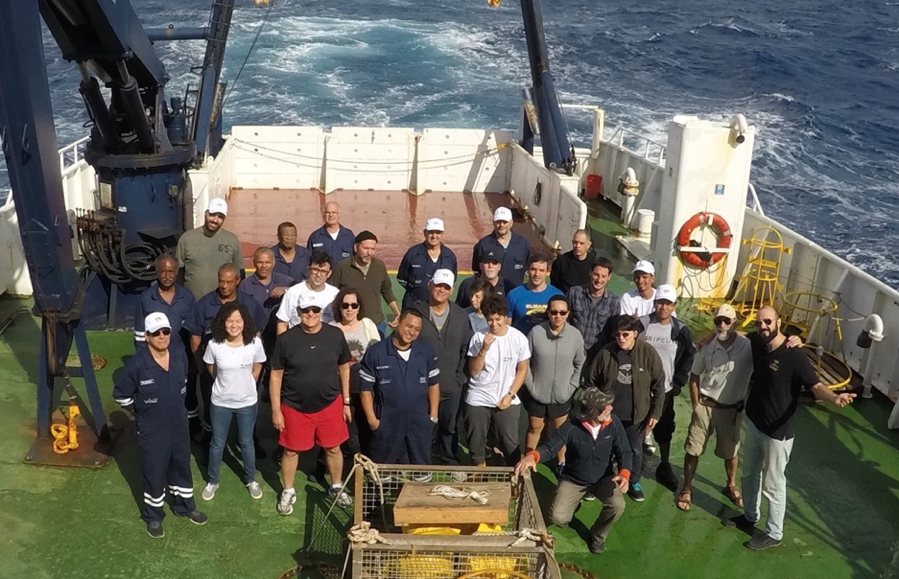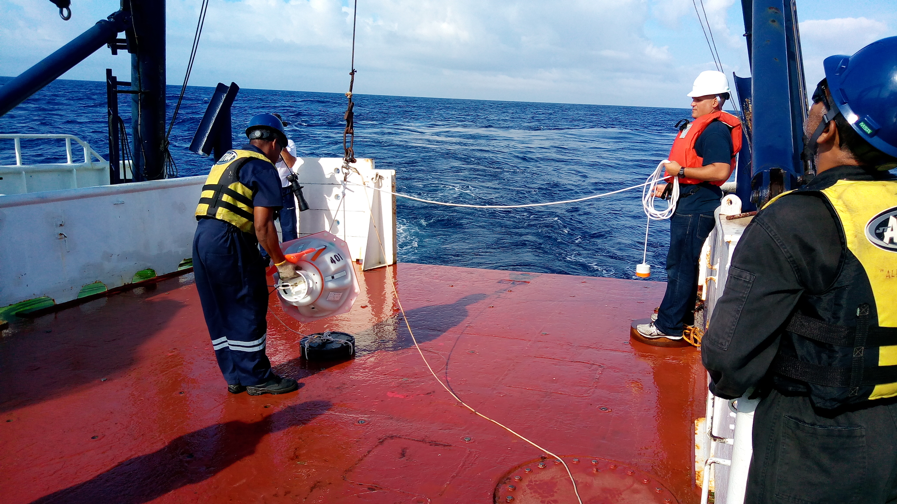AOML/CIMAS team participates in international South Atlantic research cruise to collect important data and turn-around moorings
Pedro Pena (AOML) and Rigoberto Garcia (CIMAS), from AOML's Physical Oceanography Division, joined with partners from several Brazilian, Argentine and Uruguayan institutions on a recent South Atlantic research cruise to collect observations and maintain moored instruments studying the Meridional Overturning Circulation (MOC). Pena and Garcia led the efforts to recover, refurbish, and redeploy important moored instruments at 34.5°S that are supported by the NOAA-funded Southwest Atlantic MOC ("SAM") project. The SAM project is a key component of the NOAA strategy to measure variations in the MOC in the Atlantic, having to date collected more than nine years of daily full-water-column observations.
The SAM array measures the western boundary flows associated with the MOC, and in 2013 it also became the cornerstone of an international array to measure the basin-wide MOC transports across 34.5°S - which is known as the South Atlantic MOC Basin-wide Array ("SAMBA"). SAMBA is supported by Argentina, Brazil, France, South Africa, and the United States. The April 20-May 3, 2018, cruise maintained the western end of SAMBA, and brought together a diverse team of scientists from the Universidade de São Paulo, the Universidade Federal do Ceara, the Universidade Federal da Bahia, the Universidade Federal do Rio Grande, and the Universidade do Estado do Rio de Janeiro in Brazil, the Servicio de Hidrografia Naval and the Instituto Nacional de Investigacion y Desarrollo Pesquero in Argentina, the Universidad de la Republica in Uruguay, and the U.S. NOAA-AOML.

Science party photo from the April 20-May 3, 2018, cruise onboard the Brazilian research vessel N.Oc. Alpha-Crucis. Prof. Edmo Campos, of the Universidade de São Paulo, was the Chief Scientist. (Photo courtesy Edmo Campos.)
The captain and crew of the Brazilian research vessel N.Oc. Alpha-Crucis sailed their ship efficiently and effectively, skillfully approaching each of the key NOAA moorings so they could be recovered safely. The AOML team also aided in the recovery and redeployment of several important Brazilian moored instruments in the array. NOAA's contribution to this effort is funded by the NOAA Climate Program Office/Ocean Observing and Monitoring Division and by the NOAA Atlantic Oceanographic and Meteorological Laboratory.

Pedro Pena prepares to deploy one of the NOAA pressure-equipped inverted echo sounder (PIES) moored instruments with the able help of some of the N.Oc. Alpha-Crucis crew. (Photo courtesy Carlos Teixeira.)